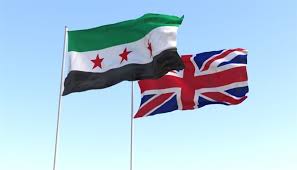Britain lifts sanctions on 12 Syrian entities.. Damascus welcomes the move.
April 25, 2025114 ViewsRead Time: 3 minutes

Font Size
16
Syria welcomed on Thursday, April 24, the decision of the United Kingdom to lift sanctions on 12 Syrian entities, including governmental, financial, and energy institutions, considering the step a "constructive milestone" in the path of normalizing international relations and supporting reconstruction efforts and improving living conditions after years of war.
An official statement from the Syrian Ministry of Foreign Affairs stated that the British decision included lifting restrictions on vital sectors such as financial services, energy, as well as the defense and interior ministries, and some media institutions, which will, according to the statement, contribute to "stimulating investments and launching reform projects in public institutions."
The Syrian Foreign Ministry affirmed that this step represents "recognition of the Syrian people's right to live in dignity after years of conflict," expressing readiness to cooperate with international partners to achieve peace, stability, and push forward the reconstruction process.
Meanwhile, Syrian Foreign Minister Asaad al-Shaaban described the British decision as a "positive shift" in international dealings with Syria, stating: "The British decision represents a pivotal step towards infrastructure reform and enhancing security, marking a shift in international dealings with the Syrian people after years of suffering and deprivation."
Details of the British Decision
The British government announced earlier on Thursday the lifting of asset freezes on the Syrian defense and interior ministries, the General Intelligence Directorate, and several other entities, as per a notice published by the British Treasury.
The decision included removing 12 entities from the sanctions lists, allowing them access to their frozen assets in Britain, as part of a comprehensive review of sanctions on Syria that began earlier this year.
It is worth noting that London had previously lifted sanctions in March on the Central Bank of Syria and 23 other entities, including financial institutions and energy companies.
Excluding Those Involved in Corruption
Despite the partial easing of sanctions, Britain confirmed the continued freezing of assets of individuals from the previous regime, especially those involved in crimes like drug trafficking, emphasizing the separation of the economic track from the violations file.
A British statement clarified that this step aims to support the political transition in Syria and alleviate the suffering of civilians, without granting immunity to those involved in corruption.
Possible Implications
Observers believe that the British decision may prompt other Western countries to review their policies towards Syria, especially in the new political climate after the fall of the Assad regime, and the current government's efforts led by President Ahmed al-Shar'a to reintegrate internationally.